Theopolitical Visions Series (15 vols.)
Digital Logos Edition
Overview
Theopolitical Visions seeks to open up new vistas on public life, hosting fresh conversations between theology and political theory. This series assembles writers who wish to revive theopolitical imagination for the sake of our common good.
Theopolitical Visions hopes to re-source modern imaginations with those ancient traditions in which political theorists were often also theologians. Whether it was Jeremiah’s prophetic vision of exiles “seeking the peace of the city,” Plato’s illuminations on piety and the civic virtues in the Roman Republic, St. Paul’s call to “a common life worthy of the Gospel,” St. Augustine’s beatific vision of the City of God, or the gothic heights of medieval political theology, much of Western thought has found it necessary to think theologically about politics, and to think politically about theology. This series is founded in the hope that the renewal of such mutual illumination might make a genuine contribution to the peace of our cities.

- Addresses contemporary topics, including globalization, church missions, and democracy
- Discusses the relationship between theology and political theory
- Includes insights from ancient and modern philosophers and scholars
- Title: Theopolitical Visions Series
- Series: Theopolitical Visions
- Publisher: Wipf & Stock
- Volumes: 15
- Pages: 4,412
- Christianity, Democracy, and the Radical Ordinary: Conversations between a Radical Democrat and a Christian by Stanley Hauerwas and Romand Coles
- Christ, History and Apocalyptic: The Politics of Christian Mission by Nathan R. Kerr
- Redeeming the Broken Body: Church and State after Disaster by Gabriel A. Santos
- Everything Is Sacred: Spiritual Exegesis in the Political Theology of Henri de Lubac by Bryan C. Hollon
- Seek the Peace of the City: Christian Political Criticism as Public, Realist, and Transformative by Richard Bourne
- The Fullness of Time in a Flat World: Globalization and the Liturgical Year by Scott Waalkes
- Paul, Philosophy, and the Theopolitical Vision: Critical Engagements with Agamben, Badiou, Zizek, and Others edited by Douglas Harink
- The Death of Secular Messianism: Religion and Politics in an Age of Civilizational Crisis by Anthony E. Mansueto
- The End of Evangelicalism? Discerning a New Faithfulness for Mission: Towards an Evangelical Political Theology by David E. Fitch
- The Politics of Practical Reason: Why Theological Ethics Must Change Your Life by Mark Ryan
- The Borders of Baptism: Identities, Allegiances, and the Church by Michael L. Budde
- The Politics of Yahweh: John Howard Yoder, the Old Testament, and the People of God by John C. Nugent
- Chosen Nation: Scripture, Theopolitics, and the Project of National Identity by Braden P. Anderson
- Between Babel and Beast: America and Empires in Biblical Perspective by Peter J. Leithart
- Compassionate Justice: An Interdisciplinary Dialogue with Two Gospel Parables on Law, Crime, and Restorative Justice by Christopher D. Marshall
This title is included in the following collections
You can save when you purchase this product as part of a collection.
2025 Charismatic Portfolio
$4,749.99$3,562.49Logos 9 Anglican Portfolio Leg...
$4,749.99$4,749.99Wipf and Stock Ultimate Collec...
$11,593.84$8,499.992025 Ultimate Library
$23,999.99$17,999.99
- $24,999.99
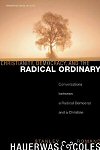
In Christianity, Democracy, and the Radical Ordinary, theologian Stanley Hauerwas and political theorist Romand Coles reflect about possibilities and practices of radical democracy and radical ecclesia that take form in the textures of relational care for the radical ordinary. They seek to shift political and theological imaginations beyond the limits of contemporary political formations (such as global capitalism, the mega-state, and empire), which they argue are based upon both the denial and production of death.
Hauerwas and Coles call us to a revolutionary politics of “wild patience” that seeks transformation through attentive practices of listening, relationship-building, and a careful tending to places, common goods, and diverse possibilities for flourishing. Both authors translate back and forth across—as well as dwell in the tensions between—the languages of radical democracy and of trial, cross, and resurrection. Engaging each other through a variety of genres—from essays, to letters, to cowriting and dialogue—Hauerwas and Coles seek to enact a politics that is evangelical in its radical receptivity across strange differences and that cultivates power in relation to vulnerability.
The authors argue that there is a strong relation between hope and imagination, as well as between imagination and the encounter with and memory of those who have lived with receptive generosity toward the radical ordinary. Hence, throughout this book they think extensively in relation to specific lives and practices: from Ella Baker and the early Student Nonviolent Coordinating Committee organizing efforts for beloved community and civil rights, to L’Arche communities founded by Jean Vanier, to contemporary faith-based radical democratic organizing efforts in dozens of cities by the Industrial Areas Foundation. Pushing and pulling each other into new and insightful journeys of political imagination, this conversation between a radical Christian and a radical democratic trickster spurs us toward a politics that acknowledges, tends to, and enacts the powers of the radical ordinary.
This book gives me hope. It takes the conversation over Christianity and democracy in a most welcome direction: away from ism-mongering and abstractions, down to earth, where instructive and inspiring examples can be found. In the practices of people like Ella Baker, Ernesto Cortés, and Jean Vanier, Hauerwas and Coles find intimations of a politics worth emulating. That, it seems to me, is exactly where we should be looking.
—Jeffrey Stout, professor of religion, Princeton University
Romand Coles and Stanley Hauerwas have probed the practices of radical democracy and radical Christianity, respectively, for some years. Here they present a series of exchanges in which each is electrified—both shocked and enlivened—by currents from the other. This book is indispensable for those seeking to animate democratic spirituality.
—William E. Connolly, Krieger-Eisenhower Professor of Political Science, Johns Hopkins University
Organizers and leaders are always looking for tools to develop a deeper conversation between faith traditions and democracy. For those of us who are working to develop institutional strategies, Hauerwas and Coles’ work is an important resource.
—Ernesto Cortés Jr., executive director of the West/Southwest regional network, Industrial Areas Foundation
Stanley Hauerwas is the Gilbert T. Rowe Professor of Theological Ethics at Duke Divinity School, Duke University. He is the author of A Better Hope: Resources for a Church Confronting Capitalism, Democracy, and Postmodernity.
Romand Coles engages in grassroots politics in Durham, North Carolina, and was an associate professor of political science and Germanic languages & literature at Duke University. He currently serves as a professor and director of Program in Community, Culture, and Environment.
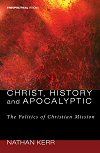
This book offers a comprehensive reflection on what it means that Christians claim that “Jesus is Lord” by engaging in a defense of Christian apocalyptic as the criterion for evaluating the “truth” of history and of history’s relation to the transcendent political reality that theology calls “the Kingdom of God.” The heart of this work comprises an original genealogical analysis of twentieth-century theological encounters with the modern historicist problematic through a series of critical engagements with the work of Ernst Troeltsch, Karl Barth, Stanley Hauerwas, and John Howard Yoder. Bringing these thinkers into conversation at key points with the work of Walter Benjamin, Carl Schmitt, John Milbank, and Michel de Certeau, among others, this genealogy analyzes and exposes the ideologically “Constantinian” assumptions shared by both modern liberal and contemporary post-liberal accounts of Christian politics and mission. On the basis of a rereading of John Howard Yoder’s place within this genealogy, the author outlines an alternative “apocalyptic historicism,” which conceives the work of Christian politics as a mode of subversive, missionary encounter between church and world. The result is a profoundly original vision of history that at once calls for and is empowered by a Christian apocalyptic politics, in which the ideologically reductionist concerns for political effectiveness and productivity are surpassed by way of a missionary praxis of subversion and liberation rooted in liturgy and doxology.
A rare gift—a critic from whom you learn. Though I do not agree with all of his criticisms of my work, Kerr—drawing imaginatively and creatively on the work of Troeltsch and Barth—has rightly framed the questions central to my and Yoder’s project. We are in his debt for having done so. In this book, Kerr not only establishes himself as one of the most able readers of my and Yoder’s work, but he is clearly a theologian in his own right. We will have much to learn from him in the future.
—Stanley Hauerwas, Gilbert T. Rowe Professor of Theological Ethics, Duke Divinity School
This is a timely book that traverses twentieth-century theology to develop a distinctive understanding of church engagement with the world. Finely executed and acutely discerning, it opens up an ecclesiology that is neither culturally accommodating nor counter-cultural. Conceiving the church as fundamentally dispossessive and missionary, Kerr announces a genuinely apocalyptic Christian politics. This is excellent theology for the up and coming generation.
—Graham Ward, Samuel Fergusson Professor of Philosophical Theology and Ethics, University of Manchester
This is a really exciting book: engaging, provocative, and—above all—constructive. Kerr seeks to reaffirm the Christian claim that Jesus Christ is the Lord of history in the face of modernity’s attempts to subsume Christ into our history. In spite of the complexity of its material, this fascinating book is so remarkably clear throughout that I found it hard to put down. It should not be ignored.
—Nicholas M. Healy, professor of theology and religious studies, St. John’s College of Liberal Arts and Sciences, St. John’s University
Nathan R. Kerr is assistant professor of religion, Trevecca Nazarene University, Nashville, Tennessee. He is the author of Exodus, Exile, and Ecclesia.
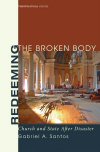
This book examines how repertoires of speech and action that are often considered to be mutually exclusive—those of church and state—clash or unite during the postdisaster period as local communities and cities struggle to establish a stable collective identity. Based on an analysis of 40 in-depth interviews with disaster-response participants and over 325 print-media sources, this study explores, first, the extent to which ministers and citizens challenge statist narratives in order to publicly relay theological views; second, the cultural processes by which local places are nationalized and theologized; and third, the ecclesiological convictions necessary to peaceably advance the work of Christ’s body after disasters.
Santos brilliantly shows how only a politics of the cross provides us with a true theoretical insight into the increasing instance of disaster and a true practical measure of restorative response.
—John Milbank, professor of religion, politics, and ethics, University of Nottingham
I know of no other book like this one. Santos has taken his training as a sociologist and combined it with astute theological analysis. The book is fascinating because macro-observations about the larger contest and cooperation between the church and the nation-state are rooted in microanalyses of empirical data and interviews of ordinary people responding to disasters. This book will add to social theories about the ‘states of emergency’ under which we live. It will also add to theological reckonings with the idea that the whole of the Christian life is a response to disaster.
—William T. Cavanaugh, professor of theology, DePaul University
This book offers an original study-disasters and the church-state interactions that follow them-which sheds light on the big questions of civil religion and the use of theological language for political ends. Crises of various sorts have become catalysts in redrawing-or erasing-the lines between church and state, civic and sacred, citizen and believer. Not only does he offer a masterful account of how and why this happens, Gabriel Santos also provides a nuanced theological assessment on why this is harmful to the church and its mission. This is a well-written example of interdisciplinary scholarship done well. This timely and provocative book deserves broad reception and discussion.
—Michael L. Budde, professor, Department of Political Science, DePaul University
Gabriel A. Santos is assistant professor of sociology and criminology, at Lynchburg College.
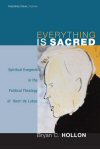
It is well known that Henri de Lubac’s groundbreaking and highly controversial work on nature and grace had important implications for the Church’s relationship to culture and was intended to remove a philosophical obstacle hindering Catholicism’s faithful engagement with the secular world. This book addresses a too-often-neglected dimension of de Lubac’s theological renewal by examining the centrality and indispensability of spiritual exegesis in his oeuvre and making explicit its social and political significance for the Church’s worship and witness. In addition to exploring the historical and ecclesial context within which he worked, the current work brings de Lubac into a critical engagement with the more recent theological movements of postliberalism and Radical Orthodoxy in order to demonstrate the enduring significance of his theological vision.
Hollon offers the best introduction to date on de Lubac’s spiritual interpretation of Scripture. His bold recovery of Henri de Lubac’s participatory hermeneutic offers an excellent contribution to the rapidly growing scholarship on the French Catholic theologian. The book argues for a hermeneutic that avoids the dual trap of isolating Jesus’ biblical identity from the life of the Church (the post-liberal tendency) and of reducing Christology to ecclesiology (the fallacy of Radical Orthodoxy). Hollon convincingly argues that the Church’s ontological participation in Christ is mediated through the practice of spiritual interpretation along the lines advocated by de Lubac. The result is both an incisive, sympathetic-critical engagement with contemporary hermeneutics and a superb introduction to one of the central concerns of de Lubac.
—Hans Boersma, J. I. Packer Professor of Theology, Regent College
Everything is Sacred is an excellent introduction to the polemical and influential writings of Henri de Lubac . . . This book will be useful to scholars in hermeneutics, philosophy, systematic and historical theology.
—Catholic Books Review
Hollon’s conviction that de Lubac’s theology is christologically grounded is notable. Indeed, he contends that, despite the absence of rhetoric, de Lubac in fact goes further than radical orthodoxy in ‘extending a fully Christianized ontology.’ This is not immediately obvious, hence the importance of the book’s treatments of de Lubac’s Corpus Mysticum ecclesiology and especially his spiritual exegesis: both are unified in Christ.
—Modern Theology
This is a useful study that rightly corrects Milbank’s use of de Lubac and makes a serious contribution to the conversation over radical orthodoxy.
—Theological Studies
Eminently accessible, and in the process it presents a powerful defense of de Lubac’s hermeneutical concerns.
—Reviews in Religion and Theology
Bryan C. Hollon is the director of the Master of Arts in Theological Studies Program and associate professor of theology at Malone College in Canton, Ohio.
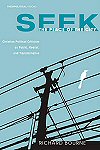
Seek the Peace of the City provides a robust engagement with the theological foundations and practices of Christian social and political criticism. Richard Bourne identifies a theological realism found in the work of John Howard Yoder. This realism bases social and political criticism in the purposes of a nonviolent, patient, and reconciling God. Bourne develops this account and shows how it is consonant with aspects of the work of a range of contemporary theologians including Stanley Hauerwas, John Milbank, Karl Barth, and Dietrich Bonhoeffer. In developing this theological realism, the book furnishes an account of Christian criticism capable of addressing key debates in contemporary theology and political theory.
Bourne begins by arguing for the public status of theological political claims. He demonstrates that only a vigorous theological realism, grounded in the universal lordship of Christ, is capable of providing a foundation for local, particular, and ad hoc practices of critique. The book concludes by developing an account of the impact such a theological realism and practice of critique might have on contemporary political theory—with explorations of the doxological nature of social change, the changing shape of the state, governmentality and political sovereignty, and the status and role of religious communities in civil society.
Imaginatively drawing on a wide range of theological literature, social, and political theory, Bourne, in a manner unlike anyone else, helps us see how the work of John Howard Yoder provides a constructive politics for Christians in our day. Only someone completely at home in Yoder’s work could have written such a lucid and helpful book. Bourne, hopefully, has made John Howard Yoder indispensable for work in political theology.
—Stanley Hauerwas, Gilbert T. Rowe Professor of Theological Ethics, Duke Divinity School
Richard Bourne won’t let you get away with detachment. This bold book pushes the question of the gospel’s particularity beyond every cowardly formalism and safe universal. Even the postmodern anxieties only reveal a fear of commitment. Bourne’s alternative for the church is like the thinkers he most admires: radical in its critique and peaceable in its politics.
—Craig Hovey, assistant professor, Ashland University
Richard Bourne is senior lecturer in theology and ethics at the University of Cumbria. He previously held teaching positions at Trinity and All Saints College, Leeds, and the Open Theological College.
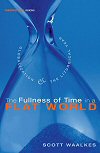
Best-selling author Thomas Friedman says that globalization has made the world flat and that we cannot stop the process. But while it is right to say that globalization tends to flatten our world, it is wrong to say that there are no alternatives to current patterns of economic, ecological, political, and cultural integration. This book argues that the Christian liturgical calendar provides a constructive alternative to the globalization of economics, ecologies, politics, and cultures. It does so by incorporating the church into the fullness of time in the gospel narrative, thereby helping us escape from the dead end of Friedman’s flat world so that we can improvise healthier ways of being globally integrated.
We usually think of globalization as a matter of space—a shrinking globe, porous boundaries, flows of capital. In an insight that is jarring and brilliant, Scott Waalkes argues that globalization is also a matter of time. Diagnosing the corrosive construal of time and space in globalized consumer capitalism, Waalkes shows how ancient Christian practices of time-keeping can remake our world and our economic habits, apprenticing us to the One born ‘in the fullness of time.’ A stellar book that deserves wide attention.
—James K. A. Smith, professor of philosophy, Calvin College
In this book Waalkes brings the best of political science and theology to bear on the question of globalization. Waalkes understands that there is more than one way to imagine globalization. In the face of ideologies that treat globalization as fate, Waalkes provocatively argues that Christian liturgical practices provide a truer way of narrating the world. Liturgy can thus help Christians and others to understand and resist the negative effects of globalization. This is an excellent work of practical theology.
—William T. Cavanaugh, professor of theology, DePaul University
Scott Waalkes has delivered an integrated analysis of global politics, economics, and the church—timely in its descriptions, analyses, and recommendations. He moves smoothly from global abstractions to the particularities of his—and our—everyday, local church life. This book aims to teach and encourage and succeeds admirably at both.
—Michael L. Budde, professor, Department of Political Science, DePaul University
This book will challenge you to see Christian worship and the global economy in a fundamentally new way . . . For all Christians who have felt overwhelmed by the tsunami forces of globalization or seduced by the mantra that ‘time is money,’ this book offers a word of hope . . . and a practical guide to more faithful forms of worship and discipleship.
—John D. Roth, professor of history, Goshen College
Scott Waalkes (PhD University of Virginia) is professor of international politics at Malone Malone University in Canton, Ohio. He spent a year abroad as a Fulbright Scholar with his family in 2004–2005.
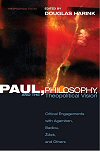
The Apostle Paul was a man of many journeys. We are usually familiar with the geographical ones he made in his own time. This volume traces others—Paul’s journeys in our time, as he is co-opted or invited to travel (sometimes as abused slave, sometimes as trusted guide) with modern and recent continental philosophers and political theorists. Kierkegaard, Nietzsche, Heidegger, and Benjamin, Taubes, Badiou, Zizek, and Agamben—Paul journeys here among the philosophers. In these essays you are invited to travel with them into the regions of philosophy, hermeneutics, political theory, and theology. You will certainly hear the philosophers speak. But Paul will not remain silent. Above the sounds of the journey his voice comes through, loud and clear.
Is it good news that Zizek, Badiou, and Agamben have re-found Paul? I am not yet sure, since this may signal a new route into the Word or a new route out. Paul, Philosophy, and the Theopolitical Vision offers urgent instruction on how to keep this a route in. And that is very good news indeed. A powerful, brilliant, and urgent book!
—Peter Ochs, Edgar M. Bronfman Professor of Modern Judaic Studies, University of Virginia
To the surprise of many, the Apostle Paul has brought new energy to continental philosophy. But to date, the ‘Pauline turn’ in contemporary theory has been rather isolated from scholars in biblical studies—where Paul is undergoing a different kind of reconsideration. Finally, this volume changes all of that, bringing together philosophers, biblical scholars, and theologians to assess and engage the ‘postmodern Paul,’ intimating a Pauline revolution that not even Zizek could have dreamed.
—James K. A. Smith, professor of philosophy, Calvin College
This collection of essays forms a front that takes on recent philosophical interpretations of Paul by the likes of Heidegger, Benjamin, Taubes, Badiou, Zizek, and Agamben with the best voices in contemporary theology and biblical studies. What you get is nothing less than a new composition of the very core structures that make up theology, critical theory, and biblical studies—indeed the humanities as such! In this way, these arguments enact a very Paulinean Event that stands toe-to-toe with philosophy’s greatest figures in order to identify the truth of God’s act in History—The Scandal of the Incarnation!
—Creston Davis, professor of philosophy, Rollins College
In this wonderful collection of essays, an adept team of scholars, expertly marshaled and framed by Douglas Harink, engages with the intriguing conversation currently unfolding between the Apostle Paul and certain modern European theorists. The result is a dialogue rich with insights flowing in both directions—from modern theory to new (or recovered) angles of illumination on Paul, and from the apostle’s charged texts back to the presuppositions and conceits of modern theory. That the view of Paul often pressed is ‘apocalyptic,’ in the sense of drawing on the seminal work of J. Louis (Lou) Martyn, makes the analysis still richer. The result is a book that both educates and delights.
—Douglas A. Campbell, associate professor of New Testament, Duke Divinity School
There is a rich education to be had within these covers. On the one hand, the essayists offer crucial insights into what all the fuss is about regarding the philosophical rediscovery of the Apostle Paul, and readers come to appreciate his varied fate in the hands of Taubes, Badiou, Agamben, and Zizek. On the other hand, these secular despoilers of Paul are themselves despoiled here, and Christian theology has set before it a wealth of provocations to better faithfulness and understanding. Taken together, these essays illumine the contours of the apocalyptic gospel of God at the heart of Paul’s own witness and make plain its import for contemporary political thought. Philosophers and theologians alike are well reminded—indeed well warned—of the dynamite they take into their hands when, in quest of a better human politics, they turn to Paul.
—Philip G. Ziegler, senior lecturer, University of Aberdeen
Douglas Harink is professor of theology at The King’s University College in Edmonton, Alberta, Canada. He is the author of Paul among the Postliberals, and 1 and 2 Peter in the Brazos Theological Commentary on the Bible.
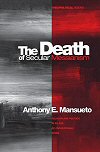
The Death of Secular Messianism argues that, the claims of secularists notwithstanding, modernity did not so much abandon humanity’s historic search for the divine, but rather transposed it into a new, innerworldly key. This “secret religion of high modernity” came in both positivistic and humanistic variants. The first sought to overcome finitude by means of scientific and technological progress. The second sought to overcome contingency by creating a collective subject—the Modern Democratic State or the Communist Party—in and through which human beings would become the masters of their own destiny. In making his case for this thesis, the author outlines a new political-theological and social-theoretical perspective which saves what is best in modernity—its focus on human creative activity and its commitment to rational autonomy and democratic citizenship—while re-engaging humanity’s great spiritual traditions.
Anthony Mansueto’s book is an important contribution to the history of thought. He describes the roots and history of the contemporary world’s ‘civilization crisis’ with an outstanding analytic mind and an encyclopedic knowledge of philosophy and the social sciences. This alone would be a considerable help in understanding the situation. But starting with those reflections, he goes further in studying what could be an answer to the crisis . . . This large synthesis, rigorously elaborated in a very clear language, is a milestone in contemporary social philosophy.
—François Houtart, emeritus professor, Catholic University, Louvain, Belgium
Anthony Mansueto is associate professor of global studies and director of General Education, University of the District of Columbia. He also serves as president and senior scholar at Seeking Wisdom.
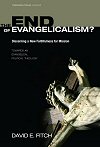
In The End of Evangelicalism? David Fitch examines the political presence of evangelicalism as a church in North America. Amidst the negative image of evangelicalism in the national media and its purported decline as a church, Fitch asks how evangelicalism’s belief and practice has formed it as a political presence in North America. Why are evangelicals perceived as arrogant, exclusivist, duplicitous, and dispassionate by the wider culture? Diagnosing its political cultural presence via the ideological theory of Slavoj Zizek, Fitch argues that evangelicalism appears to have lost the core of its politic: Jesus Christ. In so doing its politic has become “empty.” Its witness has been rendered moot. The way back to a vibrant political presence is through the corporate participation in the triune God’s ongoing work in the world as founded in the incarnation. Herein lies the way towards an evangelical missional political theology. Fitch ends his study by examining the possibilities for a new faithfulness in the present emerging, missional church movements springing forth from evangelicalism in North America.
In your hands is one of the sharpest and informed evaluations of the state of evangelicalism. Read it slowly. Ponder it. Plot a better evangelicalism.
—Scot McKnight, Karl A. Olsson Professor in Religious Studies, North Park University
In compelling fashion, Fitch digs deep to examine how key US evangelical beliefs actually function as an ideology rather than gospel. He calls us from a Christianity that acts as ‘ideology’ to one that authentically incarnates Jesus’ life and mission. What a book! This one will knock you back on your heels.
—Howard A. Snyder, professor of Wesley studies, Tyndale Seminary, Ontario, Canada
This is a significant book for those wrestling with the theological and cultural integrity of the Evangelical movement in a post-Christian setting.
—John R. Franke, theologian in residence, First Presbyterian Church, Allentown, PA
David Fitch explores three key issues that symbolize the evangelical conundrum-the inerrant Bible, the decision for Christ, and the Christian nation-by reframing them through missional theology. This is a timely and crucial read for those concerned about the evangelical movement.
—Craig Van Gelder, professor of congregational mission, Luther Seminary
David E. Fitch is B. R. Lindner Professor of Evangelical Theology at Northern Seminary, Lombard, IL. He is also the founding pastor of Life on the Vine Christian Community in the Northwest Suburbs of Chicago. He is author of The Great Giveaway.
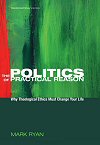
Ought we conceive of theological ethics as an activity that draws from a community’s vision of human goodness and that has implications for the kind of person each of us is to be? Or can students of the discipline map the ethical implications of what Christians confess about God, themselves, and the world while remaining indifferent to these claims? Habituated by modern moral theories such as consequentialism and deontology, Mark Ryan argues, we too often assume that Christian ethics makes no claim on the character of its students and teachers. It is rather like yet another department store within the shopping mall of ideas and ideologies to which advanced education provides access. By arguing that theological ethics is an activity by nature “political,” the author endeavors to show us that to do Christian ethics is to be habituated into ways of talking and seeing that put us on a path toward the good.
The author thus affirms the claim that theological ethics is a life-changing practice. But why is it so? This book endeavors to display a philosophical basis for this claim, by articulating the political character of practical reason. Through rigorous conversation with G. E. M. Anscombe, Charles Taylor, Stanley Hauerwas, Alasdair MacIntyre, and Jeffrey Stout, Ryan provides an account of practical reasoning that enables us to rightly conceive theological ethics as a discipline that ought to change our lives.
Drawing on Elizabeth Anscombe’s significant account of practical reason, Mark Ryan illumines not only my work but how theologians must reason to make clear the truthfulness of the claims we make as Christians. This is an extremely important book, which hopefully will receive the attention it deserves. Few are able to negotiate these philosophical waters with such clarity.
—Stanley Hauerwas, Gilbert T. Rowe Professor of Theological Ethics, Duke Divinity School
This book is as discerning as its title. By way of a critical study of Jeffrey Stout’s Democracy and Tradition, author Mark Ryan offers a surprising defense of the theopolitical thinkers Stout often criticizes: Hauerwas and MacIntrye. The defense is surprising because it takes its measure not from postliberal theology but from the claim of analytic philosopher Elizabeth Anscombe: that ethics is mere speculation unless it speaks to the realities of human desire. By this measure, argues Ryan, Hauerwas’ Christian ethics may win reason’s trust and philosophic ethics may lose it.
—Peter Ochs, Bronfman Professor of Modern Judaic Studies, University of Virginia
We have long lacked a guide for the philosophical background of Hauerwas’ thought, especially as it comes from the work of idiosyncratic Anglophone philosophers like Elizabeth Anscombe, Iris Murdoch, and Charles Taylor. Now Mark Ryan has offered us one such guide, and a generous and insightful one at that. The book represents a new step into philosophical seriousness for those of a Hauerwasian persuasion. Offering a ‘non-reductive understanding of politics’ as the context in which to see how practical reason becomes what it aims to be, Ryan shows us how Hauerwas’ ethics is actually also a politics. His provocative but charitable critiques of Charles Taylor, Gloria Albrecht, and Jeff Stout help flesh out how Hauerwas’ work is both engaged with and distinct from some of his sharpest interlocutors.
—Charles Mathewes, professor of religious studies, University of Virginia
Mark Ryan’s The Politics of Practical Reason is a thoughtful, insightful, and timely book, patiently illuminating the importance of formation as a central yet overlooked aspect of ethical deliberation. Ryan highlights the virtues of Hauerwas’ embodied, storied, and social approach to ethics by reading him as taking up Anscombe’s challenge. By incisively articulating the limitations of Stout’s and Taylor’s alternatives, this book deepens the character of conversation regarding practical reason in religious ethics today.
—Willie Young, associate professor of humanities, Endicott College
In this wondrously clear and seamlessly constructed book, Mark Ryan makes a compelling case for the centrality of practical reason in any serious contemporary account of theological ethics. Further, he shows why this account must be rooted in a politics that knits us together around a shared conception of the good that is itself practical, a form of life that anchors a lived conception of the virtues, especially justice. This gives him firm footing for assessing the trajectories of key contemporary moral thinkers: Elizabeth Anscombe, Charles Taylor, Alasdair MacIntyre, Jeffrey Stout, and Stanley Hauerwas. His reading of Hauerwas is especially helpful for future work in theological ethics, as Ryan shows how Hauerwas can help us begin to discern together not only how we think but what we most love.
—Charles Pinches, chair, Department of Theology and Religious Studies, University of Scranton
Mark Ryan is assistant professor of religious studies and theology at Georgian Court University in Lakewood, New Jersey.
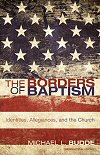
It’s a simple claim, really, that for Christians, “being a Christian” should be their primary allegiance and identity. For those who proclaim Jesus as Lord, this identity should supersede all others, and this loyalty should trump all lesser ones. It may be a simple claim, but it is a controversial one for many people, Christians and non-Christians alike.
The Borders of Baptism uses the idea of solidarity among Christians as a lens through which to view politics, economics, and culture. It offers Christians a fresh perspective capable of moving beyond sterile and dead-end debates typical of debates on issues ranging from immigration and race to war, peace, and globalization.
The Borders of Baptism invites Christians of all traditions to reflect on the theological and political implications of first “being a Christian” in a world of rival loyalties. It invites readers to see what it might mean to be members of a community broader than the largest nation-state; more pluralistic than any culture in the world; more deeply rooted in the lives of the poor and marginalized than any revolutionary movement; and more capable of exemplifying the notion of e pluribus unum than any empire past, present, or future.
Contemporary Catholic and Protestant ethics are rather divided on the significance of the renewed focus on Christian identity in theology. Whatever side one is on, Michael Budde’s The Borders of Baptism is essential reading. Budde’s vision of ecclesial solidarity is stunning, moving the discussion beyond platitudes and slogans to both argue for and display the practices necessary for Christians who wish to take seriously their baptismal commitment.
—John Berkman, associate professor of moral theology, Regis College, The Jesuit School of Theology at the University of Toronto
What would it look like if Christians took their baptisms and baptismal vows seriously, not just in so-called ‘spiritual’ matters, but in every aspect of life? With his usual wit and clarity Michael Budde shows us some of the ways that baptism intersects with issues of immigration, race, national identity, class, and globalization. A must read for those who take ecclesial solidarity and discipleship as their defining loyalty.
—Barry Harvey, professor of theology, Baylor University
Michael Budde is professor of political science at DePaul University. He is the author of The (Magic) Kingdom of God.
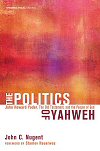
John Howard Yoder is most famous for arguing in The Politics of Jesus that a sound reading of the New Testament demonstrates the abiding relevance of Jesus to social ethics. However, it is seldom acknowledged that Yoder makes essentially the same argument with regard to the Old Testament. Throughout his extensive writings, Yoder offers a provocative interpretation of the Old Testament that culminates in the way of Jesus and establishes the ethical, ecclesiological, and historiographical continuity of the entire biblical canon. In The Politics of Yahweh, presented as a prequel to The Politics of Jesus, John C. Nugent makes Yoder’s complete Old Testament interpretation accessible in one place for the first time.
Nugent does not view Yoder’s interpretation as flawless. Rather, Nugent moves beyond summary to offer honest critique and substantial revision. His constructive proposal, which stands in fundamental continuity with the work of Yoder, is likely to provoke thought from theologians, biblical scholars, and ethicists. Even at points where readers disagree with some of his and Yoder’s interpretations, they will be challenged to explore new perspectives and rethink common assumptions concerning the diverse and often confusing issues that arise from sustained reflection on the Old Testament.
Making up for the paucity of attention to the Old Testament in ecclesiology, Nugent shows that Yoder’s unique ‘Israel-like view of the Church’ substantially draws on the Old Testament as an essential part of the narrative arc in understanding God’s work in forming a ‘royal priesthood’—a mission that culminates in Christ and his body, the ecclesia. This is an important corrective to some recent re-readings of Yoder, which have no room to account for history—and particularly the history of Israel—in Yoder’s missional ecclesiology. This is an important contribution to current debates.
—James K. A. Smith, professor of philosophy, Calvin College
It is beyond doubt that John Howard Yoder is a pivotal, defining force in contemporary theology, particularly as pertains to faith in the public domain. But Yoder is often thinly understood from his best-known work. This welcome volume pays close and fresh attention to the depth and rich scope of Yoder’s interpretation, especially with reference to his careful reading of the Old Testament. The outcome is an awareness of Yoder’s imaginative competence as a biblical theologian facing the demanding work of a Christian reading of the Old Testament. A plus of the volume is an extensive Yoder bibliography.
—Walter Brueggemann, emeritus professor of Old Testament, Columbia Theological Seminary
In his many books and articles, and in a vast number of unpublished essays and lectures, John Howard Yoder encompassed virtually the entire theological curriculum. John Nugent, whose breadth is similarly impressive, has here provided a comprehensive summary and critical evaluation of Yoder’s interpretation of the Old Testament, especially as it bears on the issue of ‘pacifism,’ or to be more precise, as Yoder and Nugent would have it, trust in God.
—Ben C. Ollenburger, professor of biblical theology, Associated Mennonite Biblical Seminary
This wonderful book is all I hoped for—and more. Nugent clearly knows Yoder’s thought extremely well. With considerable intelligence and discernment, he has shown the vital importance of the Old Testament roots of The Politics of Jesus. But more than that, he has written a book that has great relevance for all Christians interested in the relationship between the Testaments, especially as related to the subject of peace.
—Mark Thiessen Nation, professor of theology, Eastern Mennonite Seminary
John C. Nugent is professor of Old Testament at Great Lakes Christian College. He is the editor of Radical Ecumenicity: Pursuing Unity and Continuity after John Howard Yoder and The End of Sacrifice: The Capital Punishment Writings of John Howard Yoder.
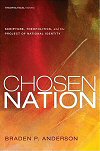
Christian teaching and modern sensibilities both eschew “nationalism” as an extreme, fanatical form of patriotism, an excessive or disordered form of an otherwise healthy and proper national identity. But what if the problem of nationalism is something much more fundamental? What if nationalism is actually the process leading to national identity in the first place? And what happens when this process entails selectively appropriating and reinterpreting the Christian tradition for the sake of the envisioned nation?
This book takes up these questions within the context of American Christian nationalism. Here, the process of interweaving the Christian narrative with American history and myth is examined in depth through a thorough engagement with scholarship on nationalism and within a framework shaped by contemporary theopolitical studies and the biblical narrative. The study aims to discern how the Christian Scriptures and theological tradition have been used by Christians themselves to further what amounts to an alternative gospel. In so doing this book charts a path for the church to evaluate itself honestly in light of Christ’s lordship, repent, and learn to tell its story more truly.
It would be hard to overstate the importance of this book. Taking the work of Yoder, Hauerwas, and Cavanaugh a crucial step further, Anderson explores why and how nationalism—particularly in America—is so often bred, nurtured, and promoted as political good news in and by the church itself through distorted readings of the biblical narrative, thereby fundamentally compromising the church’s witness. . . . Churches and Christians in all nations must heed carefully the compelling argument of this book.
—Douglas Harink, professor of theology, The King’s University College, Edmonton, Canada
This is a creative and challenging exploration of the issues, controversies, and challenges that surround questions of Christianity and nationalism. Braden Anderson makes an original and important contribution to debates on whether and how ‘being a Christian’ affects other identities, loyalties and priorities. His exploration of Scripture, political theology and contemporary issues makes this a rewarding book for scholars, pastors, and lay leaders.
—Michael L. Budde, professor, Department of Political Science, DePaul University
Braden P. Anderson earned his PhD in theology and society from the Department of Theology at Marquette University. He also completed previous graduate degrees in theology from Marquette and in political science from the University of Kansas.
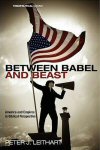
The United States is one of history’s great Christian nations, but our unique history, success, and global impact have seduced us into believing we are something more—God’s new Israel, the new order of the ages, the last best hope of mankind, a redeemer nation. Using the subtle categories that arise from biblical narrative, Between Babel and Beast analyzes how the heresy of Americanism inspired America’s rise to hegemony while blinding American Christians to our failures and abuses of power. The book demonstrates that the church best serves the genuine good of the United States by training witnesses—martyr-citizens of God’s Abrahamic empire.
When I read a critique of the heresy of ‘Americanism’ from someone who nonetheless ‘loves America,’ I take notice: this is not the usual predictable boilerplate. In this important book, Leithart brings his usual verve, erudition, and nuance to bear on one of the central idolatries of our age.
—James K. A. Smith, professor of philosophy, Calvin College
Between Babel and Beast offers a bracing critique of American political history and a pastoral call for repentance from imperial ‘Americanism.’ But Leithart’s distinctive analysis provides a more complex—and potentially more constructive—biblical perspective on international politics than can be found in the many ecclesial critics of empire. This crisply argued and highly readable companion to Defending Constantine confirms that Leithart is one of the most interesting voices in theology today.
—Eric Gregory, professor of religion, Princeton University
Peter J. Leithart is a senior fellow of theology and literature at New St. Andrews College, Moscow, Idaho, and serves on the pastoral staff of Trinity Reformed Church. He is the author most recently of Athanasius.
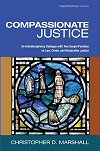
Two parables that have become firmly lodged in popular consciousness and affection are the parable of the Good Samaritan and the parable of the Prodigal Son. These simple but subversive tales have historically had a significant impact on shaping the spiritual, aesthetic, moral, and legal traditions of Western civilization, and their capacity to inform debate on a wide range of moral and social issues remains as potent as ever. Noting that both stories deal with episodes of serious interpersonal offending, and both recount restorative responses on the part of the leading characters, Compassionate Justice draws on the insights of restorative justice theory, legal philosophy, and social psychology to offer a fresh reading of these two great parables. It also provides a compelling analysis of how the priorities commended by the parables are pertinent to the criminal justice system today. The parables teach that the conscientious cultivation of compassion is essential to achieving true justice. Restorative justice strategies, this book argues, provide a promising and practical means of attaining this goal of reconciling justice with compassion.
This is how political theology ought to be done. Marshall takes the fundamentally local problem of how communities restore relationships broken by criminal behavior and applies the insights of Jesus’ best-known parables. Marshall shuttles back and forth between the biblical narratives and the best of social science to enhance both . . . I felt like I was reading Jesus’ parables for the first time, and I also learned to think in new ways about criminal justice.
—William T. Cavanaugh, professor of theology, DePaul University
In his important new book, Marshall presents penetrating readings of the parables of the Good Samaritan and the Prodigal Son and uses these to provide fascinating new insights into the nature of restorative justice. The book culminates with an outstanding analysis of the role compassion should play in criminal justice. This is essential reading for anybody interested in serious thinking about the meaning of crime and justice.
—Gerry Johnstone, professor of law, University of Hull
Few but Marshall could have written this book. In it he brings the parables of the Good Samaritan and the Prodigal Son into a lovingly detailed conversation with the main facets of restorative justice. The result is a deeply instructive journey . . . The Gospel announces peace, and Marshall maps out here, recalling the words of Jesus, the only path—a steep and narrow way, much overlooked—that leads to peace. Those who reject the tyranny of the urgent and attend to Marshall’s patient prose will experience an insightful, remarkable, and profoundly important book.
—Douglas A. Campbell, associate professor of New Testament, Duke Divinity School
Compassionate Justice is an impressive addition to the burgeoning literature on restorative justice. However, it is much more than that. This is a theologically rich account of the foundations and contradictions of substantive justice viewed though the lens of the two most beloved biblical parables: the Good Samaritan and the Prodigal Son. It is imaginative and compelling and powerfully demonstrates the author’s deep understanding of justice issues and his commitment to the ethical ideals of mercy and compassion.
—Warren Brookbanks, professor of criminal law, University of Auckland, New Zealand
This is a beautifully written and thoughtful reflection on two familiar parables and the normative implications of the central moment in each: when the protagonist is ‘moved by compassion.’ An especially important contribution to restorative justice literature.
—Daniel W. Van Ness, executive director, Center for Justice and Reconciliation, Prison Fellowship International
As with his earlier publications, such as Beyond Retribution, Marshall has given us a profound book in highly readable form. His blend of biblical scholarship and contemporary insights from the social sciences and humanities will be of interest not only to Christians but to others concerned about justice in today’s world.
—Howard Zehr, professor of restorative justice, Eastern Mennonite University
Marshall is one of our most creative thinkers in the fields of biblical studies and social justice, and a pioneering advocate of restorative justice. Shedding new light on two of Jesus’ best-known parables, this engaging and accessible study challenges us to profoundly rethink our attitudes to justice and compassion, and act accordingly.
—Andrew Bradstock, Howard Paterson Professor of Theology and Public Issues, University of Otago, Dunedin, New Zealand
I love the way Compassionate Justice combines thick exegesis of Jesus with public ethics, dialoguing incisively with philosophy and public policy on criminal justice . . . showing how Jesus deepens and sharpens the discussion.
—Glen Stassen, professor of Christian ethics, Fuller Theological Seminary
No biblical scholar in the world has searched the Bible more faithfully for its support of the idea of restorative justice than has Christopher Marshall. Nor has any scholar sought more faithfully to promote that justice in the public life of his country. Here, in an intensive study of two of Jesus’ parables, he tells me as a fellow Christian that ‘justice’ in our minds ought to equal ‘healing,’ not ‘punishment.’ In the Good Samaritan and the Prodigal Son, it is clear that for Jesus the remedy for human misbehavior is the mercy of healers, not the retribution of punishers.
—Donald W. Shriver, emeritus president, Union Theological Seminary, New York
Chris Marshall teaches in the Religious Studies Program at Victoria University of Wellington, New Zealand. His many publications include, Faith as a Theme in Mark’s Narrative, Kingdom Come: The Kingdom of God in the Teaching of Jesus, Beyond Retribution: A New Testament Vision for Justice, Crime, and Punishment, Crowned with Glory and Honor: Human Rights in the Biblical Tradition, and The Little Book of Biblical Justice.
Reviews
0 ratings

David Paul
9/30/2013
One man's opinion...this entire collection and all it represents completely misses the point.